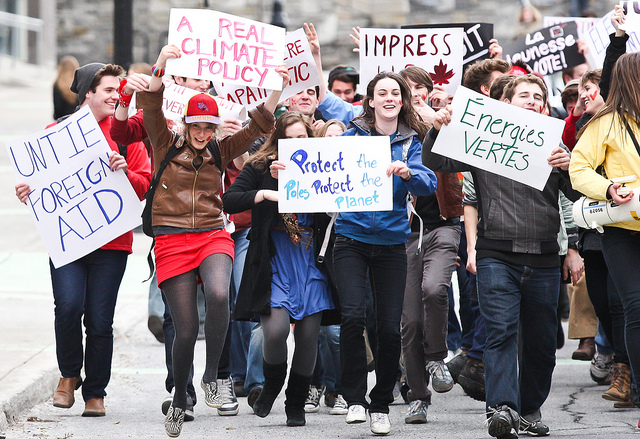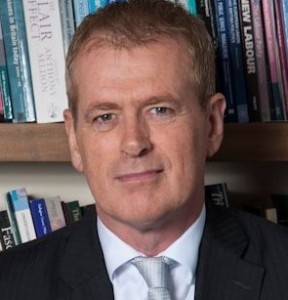Beyond the Youth Citizenship Commission: Young People and Politics
Gordon Brown established the Youth Citizenship Commission in 2008 to investigate how to increase the involvement of young people in British democracy. Although recommendations were taken forward by the previous government, youth disengagement remains a problem. In the first of a new series on Democratic Audit, Jonathan Tonge and Andy Mycock introduce a set of proposals from leading political scientists, addressing the need for practical steps to reconnect young people to politics.

How can we increase young people’s engagement in politics? Credit: Adam Scotti, CC BY-NC-SA 2.0
Debates about the state of British democracy in recent years have often drawn attention to a decline in conventional political participation and rising levels of political disengagement. Such concerns are founded on evidence of reduced turnouts in national or local elections, declining membership of political parties, and the low standing of politicians who suffer the opprobrium of sizeable sections of the public. Whilst some suggest opportunities created via the newer communication channels of social media indicate continuing interest in politics, the prevailing sense ‘on-line’ would appear to be one also dominated by cynicism towards political institutions and decline in trust of those taking decisions within such bodies.
A variety of explanations have been put forward that often relate to theories of supply or demand. Supply-based explanations draw attention to the supposed inadequacies of politicians, the unrepresentative composition of decision-making bodies, and the ineffectiveness of parliamentary institutions. Why should, it is argued, we expect young people to want to enter the ‘sunlit uplands’ of a political system and culture that is not fit for purpose. Demand-oriented explanations of political disengagement highlight the unrealistic expectations that many citizens hold with regards to decision-makers who do not have the capacity to deliver all our aspirations. On this reading, electors need to take more responsibility and engage in a politics which cannot give them all they want.
Analysis of the causes and extent of political disengagement clearly requires accommodation of both perspectives, particularly when considering younger voters. On most measurements of conventional political participation, activity amongst young people appears low when compared to other age categories. For example, the gap in electoral turnout between 18-24 year olds and those aged over 55 is higher in the UK than in any other democracy – a shocking disparity.1 It would be foolish though to simplistically compare current young voters to previous generations and denunciate them as deficient or even feckless. Harking back to an ill-defined ‘golden age’ of British democracy overlooks that politics was typically tribal and unrepresentative, with levels of participation significantly skewed by social class, ethnicity and gender.
The Beyond the Youth Citizenship Commission: Young People and Politics volume adopts a positive tone that goes beyond the simplistic denunciation of young people, and is grounded instead in the belief that it would be neglectful for those interested in the future vibrancy of British democracy to fail to address the acute problem of youth political disengagement. The contributors to the volume are keen to explore ways to better connect younger citizens with political parties, politicians, democratic institutions, and civic society more widely. The volume is thus founded upon the belief that young people are not politically apathetic and should not be demonised or compared to older voters. Civil engagement, in the form of volunteering, is at an all-time high and young people are interested in participating in our democracy when it is made accessible and relevant to them. We believe there are considerable grounds for optimism that a high level of civic engagement, underpinned with a strong political component, can be attained.
To encourage greater numbers of young people to become lifelong politically active and participative citizens will, though, require institutional reform, substantial improvements to political literacy, and an attitudinal step change for older citizens. Those engaged in the pursuit of politics must acknowledge and accept the considerable shortcomings of our contemporary political system and wider culture with regards to young people and actively seek to adopt new approaches to youth citizenship. We are keen to acknowledge the concerted efforts of recent governments of differing political complexions to engage with issues of youth engagement, encouraging cross-party cooperation and establishing networks between youth organisations, academics and others seeking to bolster the health of our democracy. The response of the Political Studies Association, the UK’s leading organisation promoting the study of politics, to the government’s The Governance of Britain Green Paper in 2007, led to very constructive engagement between politicians and academics, with the Chair of the Association and several senior members invited to serve on the Youth Citizenship Commission (2008-9) that examined how to encourage democratic participation as a form of good citizenship.
It is in the same positive and cooperative spirit that the Political Studies Association offers the ideas on youth democratic engagement contained in this publication and more widely through the promotion of the study of politics in schools, colleges and universities across the UK. The issues explored within the Beyond the Youth Citizenship Commission volume are wide-ranging, offering research-led discussion of key areas concerning youth political engagement and solid policy proposals (see below) for political parties and other decision-makers to consider. This includes ideas on how to improve youth political literacy via enhanced citizenship classes, connect with social media and promote digital democracy, develop youth engagement with political parties, revise arrangements for electoral registration, and encourage political activity amongst young women and ethnic minority communities who remain severely under-represented in political institutions. The cases for compulsory voting and a lowering of the voting age to 16 are also analysed.
The volume also provides details of a new campaign led by Political Studies Association Young People’s Politics specialist group to encourage the development of universities as ‘sites of democracy’. The group is pleased to announce the development of a ‘Charter for Active Citizenship in Higher Education’ and will be encouraging vice-chancellors and heads of Politics departments in universities across the UK to sign up.
The volume was launched at a special panel at the Political Studies Association conference in Manchester on April 16th 2014, with academics, including Professors Jon Tonge and Gerry Stoker, representatives from the Manchester Youth Council and local schools. The panel will also include young councillors from Manchester City Council and a member of the Demos Generation Citizen project. Subsequent launch events will be hosted in London and Edinburgh. Chapters from the publication will also be hosted in an exciting series of online debates here on Democratic Audit and on the Political Studies Association blog, where we hope politicians, academics, and youth organisations will respond to the policy proposals and offer their thoughts on the development of youth citizenship.
We recognise that forms of political engagement are varied and ever-changing. Political debates and activity continue to flourish via new communication channels. We seek though to encourage alternative forms of political action that complement and increase traditional key political activities involving parties and elections, for which democratic substitutes are not readily available. None of the ideas contained in this volume will in isolation achieve the universally-desired goal of better engaging young people in politics. However, the sum of the parts could represent a more holistic approach required if we are to reinvigorate British democracy.
Beyond the Youth Citizenship Commission Policy Proposals
1) Compulsory electoral registration in schools and colleges across the UK.
2) A UK-wide referendum on lowering the voting age to 16.
3) The establishment of compulsory annual MP and local councillor constituency surgeries and political party policy forums aimed at young people to be held in local schools, colleges and community centres.
4) National youth parliaments, assemblies and forums across the UK to be given the right to call a people’s ballot or citizens’ initiative referendum on a topic of their choosing.
5) The UK and devolved governments to establish out-reach activities involving political parties and youth groups to mobilise ethnic minority and Muslim young people to address issues that concern them.
6) The Westminster All-Party Parliamentary Group for Women in Parliament should establish an inquiry on Young Women in Politics in order to explore the reasons for and rectify the relative absence of young female representatives in local and national politics.
7) The introduction of statutory provision in citizenship education programmes in schools, colleges and universities across the UK of training for young people to use social media in critical participative ways.
8) The formation of a standing Commission on Education for Citizenship to monitor provision in schools and colleges in England (as recommended in the Crick Report of 1998).
9) All political parties in the UK to undertake a review of the terms of young party membership and the relationship between youth wings and the main party with the aim to increase opportunities for young people to influence policy more significantly and develop participation.
10) Creation of a ‘Charter for Citizenship’ for Higher and Further Education institutions across the UK.
—
For further details of PSA youth citizenship events linked to the project or to ask for a hard copy of the volume, please contact Dr Andy Mycock. An electronic copy of the Beyond the Youth Citizenship Commission: Young People and Politics volume can be downloaded here.
—
 |
Jonathan Tonge is a Professor of Politics at the University of Liverpool. |
 |
Dr Andy Mycock is a Senior Lecturer in Politics at the University of Huddersfield. |





 Democratic Audit's core funding is provided by the Joseph Rowntree Charitable Trust. Additional funding is provided by the London School of Economics.
Democratic Audit's core funding is provided by the Joseph Rowntree Charitable Trust. Additional funding is provided by the London School of Economics.
Beyond the Youth Citizenship Commission: Young People and Politics | @democraticaudit- https://t.co/aX2ncmlZwy #MustRead #YouthVote
@polstudiesassoc publish Beyond the Youth Citizenship Commission report on young people and politics https://t.co/Win8QChGfU
RT @democraticaudit: Beyond the Youth Citizenship Commission: Young People and Politics https://t.co/afq58g2GyI @ldbytes @BundyBoy66
Overview (inc. list of policy ideas) of launch of the #psa14 Beyond the Youth Citizenship Commission report at: https://t.co/bAAE8YJlCw
RT @LSEPubAffairs: Beyond the Youth Citizenship Commission: Young People and Politics https://t.co/HyV64AGw9U
RT @martha_barr: “@PJDunleavy: How to boost young people’s involvement with politics https://t.co/hktAUB4Xzo Beyond the Youth Citizenship Co…
How to boost young people’s involvement with politics https://t.co/jq9NP0LsCo Beyond the Youth Citizenship Commission:
“@PJDunleavy: How to boost young people’s involvement with politics https://t.co/19Po40IlFe ” interesting proposals also for #youngvoters #EU
RT @democraticaudit: Andy Mycock and @JonTonge set out proposals for increasing youth participation – new series on Democratic Audit http:/…
Beyond the Youth Citizenship Commission: Young People and Politics https://t.co/GBr5Z8mtTv